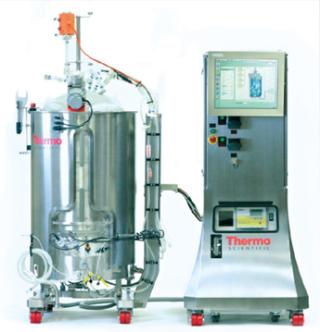Voices of Biotech
Podcast: MilliporeSigma says education vital to creating unbreakable chain for sustainability
MilliporeSigma discusses the importance of people, education, and the benefits of embracing discomfort to bolster sustainability efforts.
September 1, 2012
Thermo Fisher Scientific wrapped up its North American series of BioProcessing Technology Seminars in June 2012 in North Carolina. Over two months, the company and local biomanufacturers hosted six all-day events at different venues focusing on cell culture media design, single-use systems, bioreactor technologies, and performance optimization. Agendas included interactive presentations from industry experts and typically ended with a tour of a local bioprocessing facility.
On 21 June in Cambridge, MA, Eric Langer (BioPlan Associates) kicked off the fifth meeting in the series by reviewing the current state of cell culture processing and of the biopharmaceutical industry in general. Results of his company’s 9th Annual Report and Survey of Biopharmaceutical Manufacturing indicated that the industry is growing at a pace of 15–18%, fueled by higher expression titers and growing interest in biosimilars/biobetters. “Outsourcing has increased overall but is slowing,” said Langer. Investments have increased, with “the most prominent of vendor investments in process and product development.” That emphasis on performance has created a greater need for training so that companies can focus on productivity without further straining their already limited budgets for travel to conferences and seminars.

Ann Pisania (Acceleron) started the technical portion of the seminar with a discussion of her company’s implementation of single-use technologies. After reviewing the capabilities of clinical manufacturing and pilot-production facilities, she pointed out real-world examples of challenges with some (earlier) single-use bioreactors, including bag failure. The company now uses stirred-tank disposable bioreactors to “obtain tighter control of the process and allow for more straightforward transfer” to contract manufacturers. She also reviewed Acceleron’s other experiences with single-use systems, including obstacles that were surmounted before implementation.
Leland Paul (CMC Biologics) presented case studies demonstrating the advantages of single-use technologies at 50-L to 2,000-L capacities: single-use mixers, upstream seed trains, single-use bioreactors, and harvest (depth-filter) systems. Some related issues companies have had to address for cell culture, said Paul, include bag placement, leaks, and poor growth in seed-train culture bags. His case studies reviewed lessons learned and benefits from using single-use technology platforms, especially disposable bioreactors.
Thermo Fisher Scientific’s Millie Ullah then spoke of “next-generation” single-use systems that address manufacturing needs for greater flexibility, faster turnaround times between product campaigns, and reduced set-up times. Elaborating on Langer’s point regarding the industry’s increased emphasis on product performance, she demonstrated how advances in single-use bioreactors are meeting high-titer demands.
Currently, most sites that use disposable components or systems are “hybrid” facilities, a combination of traditional stainless-steel equipment and disposable units. Andrew Sinclair (BioPharm Services) reviewed hybrid systems for cell culture, focusing on costs associated with scale-up and scale-out. His examples included configurations for facilities using multiple 1,000-L or 2,000-L bioreactors and configurations for pooling bioreactor harvests.
Wesley D. Marner (Applikon) concluded the meeting by reviewing control equipment for disposable bioreactor systems. Considerations for selecting a controller platform include equipment layout and configuration as well as control hardware, sensors, and actuators. A good bioprocessing strategy, said Marner, ensures that all such considerations lead to an integration of one “single-use concept.”
The North American seminar series ended with similar presentations in Raleigh, NC. Earlier venues were in Bellevue, WA; Los Angeles, CA; Foster City, CA; and King of Prussia, PA. Thermo Fisher Scientific is hosting a two-day European seminar on 6–7 November in Frankfurt, Germany. That event will feature speakers from BioPlan Associates, BioPharm Services, CMC Biologics, Crucell, Cobra Biologics, Applikon, and Thermo Fisher Scientific. For more information (and to register), visit http://events.SignUp4.com/eu-seminar-2012.
You May Also Like